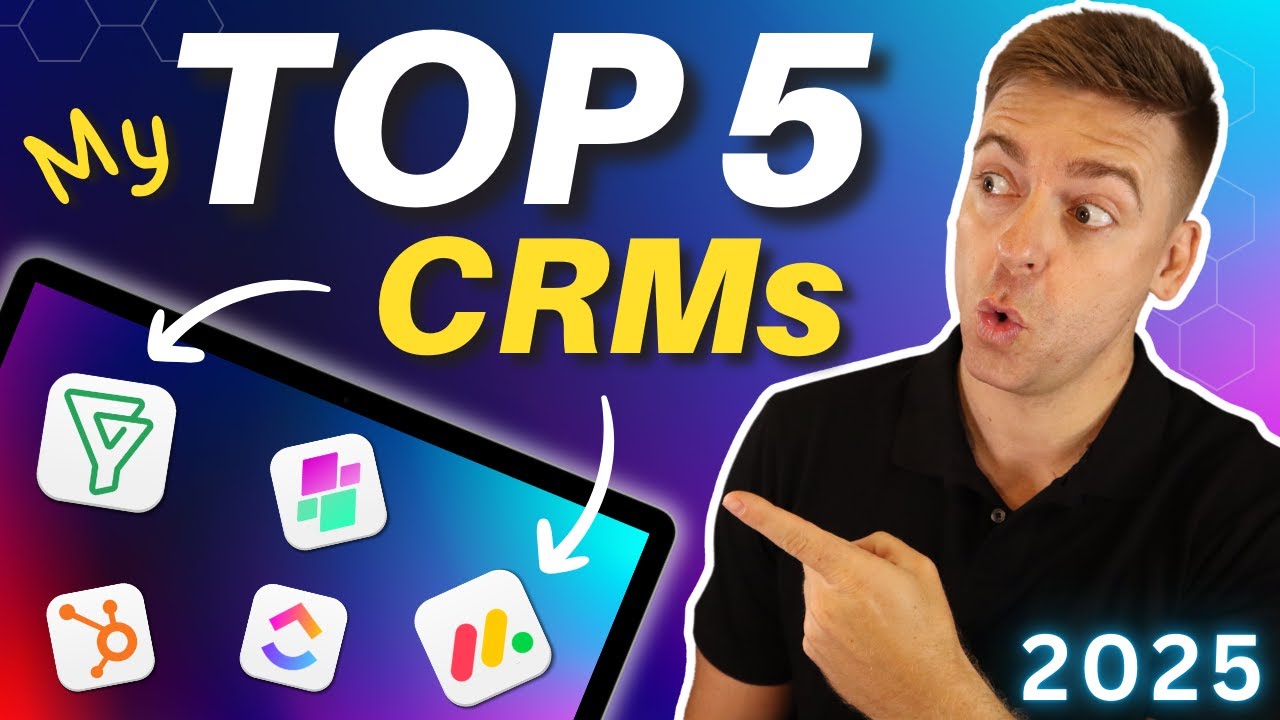Top 5 CRM for Small Business
Running a company requires clear communication efficient sales tracking and organized customer data. A reliable CRM for growing teams helps owners manage these areas from one place. It centralizes contacts streamlines follow ups and improves decision making by revealing which marketing or sales efforts produce results. The Top 5 CRM for Small Business options in this guide show how different platforms support customer relationships in practical everyday workflows.
This article follows a simple structure that includes a description key features pros cons for each CRM so owners can compare options quickly and choose the system that fits their workflow and growth goals.
Why a CRM Matters for Small Business
A CRM acts as the single source of truth for customer information. It connects leads, email history, phone calls, and sales data in one dashboard. Instead of scattered spreadsheets and inboxes, small businesses can rely on a structured system that tracks every customer touchpoint.
Key benefits include:
- Improved organization: Centralized contact lists prevent data loss.
- Automated reminders: No more missed follow-ups or calls.
- Performance tracking: Dashboards show where deals stall or convert.
- Better collaboration: Everyone shares the same view of client activity.
- Scalability: As the business grows, new users and workflows can be added without disruption.
Whether you manage five clients or five hundred, a well-implemented CRM reduces manual effort and improves consistency.
1. HubSpot CRM
Overview
HubSpot CRM is widely recognized for being beginner friendly yet powerful. It is often recommended for startups and growing teams that want marketing sales and service tools under one ecosystem.
HubSpot’s free plan includes core CRM features that are sufficient for many small teams. As needs expand, paid plans under the “HubSpot Starter, Professional, and Enterprise” tiers unlock advanced automation, analytics, and customer service modules.
Key Features
- Contact and company records with timeline activity
- Email tracking, templates, and scheduling
- Pipeline and deal management
- Meeting scheduling integration
- Custom dashboards and reporting
- Marketing tools like forms, landing pages, and email automation

Strengths
HubSpot’s interface is intuitive. Even users new to CRM can navigate its pipelines and email tracking tools without training. Integration with Gmail, Outlook, and Slack makes it suitable for remote and hybrid teams. The free plan allows unlimited users, making adoption cost-effective at the start.
Limitations
Here is the revised and expanded paragraph with the focus keyword included. No em dashes used.
HubSpot advanced features such as automation workflows and custom reporting require upgrading to paid tiers. While the free version offers a strong starting point many companies notice costs increase quickly once additional marketing or service hubs are added. For organizations with more complex sales cycles the free edition may also show some limitations in customization and granular control. That said HubSpot remains a leading option in the Top 5 CRM for Small Business because of its clean interface built in marketing tools and easy onboarding experience. Teams that want room to grow can start on the free plan learn the system and then scale into the paid features once they are ready.
Best For
Teams and local organizations that want a modern all in one CRM with marketing tools built in and a straightforward learning curve. Ideal for groups that want to manage contacts email outreach pipelines and basic automation from one place without complex setup.
External Source: HubSpot CRM Reviews on G2
2. Zoho CRM
Overview
Zoho CRM emphasizes affordability and modular flexibility. It supports sales automation, multichannel communication, and analytics while staying accessible for non-technical users. Its pricing tiers scale well for small-to-medium teams that need customization but want to avoid high enterprise costs.
Zoho also fits naturally into the broader Zoho ecosystem—offering built-in integrations with Zoho Books, Zoho Mail, and Zoho Campaigns.
Key Features
- Lead and contact management
- Sales automation with rule-based workflows
- Multichannel communication (email, phone, social)
- Analytics dashboards and AI predictions (Zia Assistant)
- Custom modules and fields
- Integrations with Google Workspace, Microsoft 365, and QuickBooks
Strengths
Zoho CRM balances power and price. Its automation and customization options rival more expensive tools. The Zia AI assistant provides predictive insights, helping prioritize leads and forecast revenue. It also offers a strong mobile app with offline mode, ideal for teams that work on-site or travel often.
Limitations
The interface is dense, and first-time users may find setup challenging. While the standard plan includes many features, the full potential of Zoho’s automation and AI requires higher tiers. Support response times can vary depending on the plan.
Best For
Companies that value deep customization and affordability, especially if already using other Zoho apps.
External Source: Zoho CRM Reviews on Capterra

3. Salesforce Starter Suite
Overview
Salesforce remains the global leader in CRM technology. The Starter Suite (formerly Essentials) delivers Salesforce’s enterprise power in a package sized for small teams. It combines contact management, opportunity tracking, and automation inside a robust cloud platform.
Key Features
- Comprehensive contact and deal management
- Email integration and activity tracking
- Custom dashboards and reports
- Task automation and AI-based recommendations
- AppExchange marketplace for third-party add-ons
- Mobile app with offline sync
Strengths
The Starter Suite inherits Salesforce’s reliability, security, and scalability. It can easily grow with the company, connecting to marketing, service, and analytics modules later. The user interface has improved dramatically in recent years, and pre-built templates help small teams deploy quickly.
Limitations
Salesforce is complex. Setup often requires initial configuration or guidance from documentation. Even the Starter Suite may feel overpowered for very small firms that only need basic tracking. Pricing is higher than entry-level tools, though justified by depth and long-term flexibility.
Best For
Teams expecting steady growth and long-term scalability, or those planning to integrate advanced analytics and customer service tools later. Ideal for organizations that want a CRM that can expand in depth and functionality as their operations mature.
External Source: Salesforce CRM Review on Forbes Advisor
4. Less Annoying CRM
Overview
Less Annoying CRM (LACRM) was designed specifically for smaller teams and independent operators that need simplicity over complexity. It removes extra modules and focuses on core CRM tasks - contact management, pipelines, and follow-up reminders.
The system uses one pricing plan ($15 per user per month) with all features included, making budgeting predictable.

Key Features
- Straightforward contact and lead tracking
- Calendar and task reminders
- Email logging via BCC
- Pipeline visualizations for sales progress
- Mobile-friendly web access
- Simple import/export and reporting
Strengths
Here is the revised and expanded section with the focus keyword included. No em dash.
Less Annoying CRM
Strengths
Ease of use is the standout advantage. There are no complex menus, no layered pricing plans, and setup typically takes only a few minutes. Customer support is personal and responsive, which is valuable for owners who do not have internal IT help. Less Annoying CRM is ideal for solo operators, consultants, and compact teams who are using a CRM for the first time and want something that just works without training sessions or configuration guides.
Its simplicity is also the reason it consistently appears in discussions around the Top 5 CRM for Small Business. Rather than overwhelming users with automation, dashboards, or marketing add-ons, it focuses on core essentials: contact management, pipelines, notes, and calendar integrations. For teams and independent operators that want clarity and control without complexity, this CRM provides exactly what they need at a predictable and affordable price point.
Limitations
Limited automation and reporting depth. Integrations with marketing or accounting platforms are minimal. Businesses needing multi-channel campaigns or advanced analytics will eventually outgrow it.
Best For
Very small teams, freelancers, or local service providers who want a simple, affordable, no-nonsense CRM that works immediately.
External Source: Less Annoying CRM Overview on G2
5. Freshsales CRM
Overview
Freshsales, part of the Freshworks suite, combines simplicity with modern automation. It targets small and mid-size businesses looking for AI-assisted sales management, email tracking, and built-in calling features.
The platform’s interface is clean, similar to HubSpot, and integrates easily with tools like Google Workspace, Outlook, and Zapier.
Key Features
- Contact and deal management
- AI lead scoring and predictive analytics
- Built-in phone dialer and email tracking
- Workflow automation
- Visual sales pipelines
- Mobile app with offline mode
Strengths
Freshsales stands out for its automation. Its “Freddy AI” analyzes engagement patterns to score leads automatically. Built-in calling reduces the need for separate VoIP tools. The combination of clean design and functionality makes it approachable for teams transitioning from spreadsheets.
Limitations
The free plan is limited to basic contact management and offers only a single sales pipeline. To unlock more advanced capabilities such as multiple pipelines, automated workflows, or AI-based lead scoring, an upgrade to a paid tier is required. Some users also report occasional sync delays when connecting Freshsales with third-party tools, particularly calendar and email systems.
Even with these limitations, Freshsales is still frequently included in the Top 5 CRM for Small Business because its paid plans scale well as a company grows. Small teams often start on the free version, get comfortable with the interface, and then expand into more advanced features once their sales process becomes more defined. This makes it a practical choice for businesses that want a clear path from simple contact tracking to full pipeline management without switching platforms later.
Best For
Teams that want an AI-driven CRM with modern design and built-in calling, without enterprise complexity.
External Source: Freshsales CRM Reviews on TechRadar

Comparative Overview
| CRM | Best For | Free Plan | Ease of Use | Scalability | AI / Automation | Price Range |
|---|---|---|---|---|---|---|
| HubSpot | All-in-one CRM with marketing | ✔ | ★★★★★ | ★★★★☆ | ★★★★☆ | Free to $$$$ |
| Zoho CRM | Customizable affordable CRM | ✔ | ★★★★☆ | ★★★★☆ | ★★★★☆ | $ to $$$ |
| Salesforce Starter | Growth-oriented, scalable CRM | ✖ | ★★★☆☆ | ★★★★★ | ★★★★★ | $$ to $$$$ |
| Less Annoying CRM | Simple low-cost CRM | ✖ | ★★★★★ | ★★☆☆☆ | ★☆☆☆☆ | $$ |
| Freshsales | AI-powered small business CRM | ✔ | ★★★★☆ | ★★★★☆ | ★★★★★ | Free to $$$ |
Free vs Paid CRM: Deciding the Right Fit
Free CRM tools help startups begin customer tracking without upfront cost. They typically include contact storage, pipeline tracking, and basic email tools. Because of their simplicity and low risk, free platforms are often where many of the Top 5 CRM for Small Business are first tested. HubSpot and Zoho lead this category for beginners and small teams.
Paid CRMs add automation, analytics, AI, and integrations with other business apps. As teams grow and processes expand, upgrading saves time through automation and data accuracy.
When Free is Enough
- You manage fewer than 200 leads
- One or two users handle most sales or support
- Reporting can remain basic
When Paid Adds Value
- You need team-wide dashboards and goals
- You want integration with accounting, chat, or email marketing
- You manage multi-stage pipelines and client renewals
The decision often comes down to how much manual work exists today versus how much automation can save tomorrow.

Key Decision Factors
1. Price and ROI
Small business owners must balance cost and long-term value. While Less Annoying CRM offers the lowest predictable cost, tools like HubSpot or Zoho may deliver greater efficiency when marketing automation is included.
2. Ease of Use
Adoption is the real measure of CRM success. An advanced platform is useless if staff avoids it. HubSpot and LACRM excel in usability, while Salesforce Starter Suite requires a bit more onboarding but delivers long-term scalability. For many small teams comparing systems, searches often come down to terms like “salesforce starter suite less annoying” as they look for configuration tips that streamline setup and reduce the learning curve.
3. Scalability
Growth potential should always factor in. Salesforce dominates here, followed by Zoho. Migrating between CRMs later can be costly and disruptive.
4. Automation and Integrations
Automation turns data into action. Freshsales leads with AI lead scoring, while HubSpot and Zoho automate marketing and sales follow-ups effectively.
5. Support and Training
Smaller teams rely heavily on responsive vendor support. Less Annoying CRM offers personal email responses. HubSpot and Salesforce maintain large knowledge bases, webinars, and user communities.

Extended Insights on CRM Adoption
Training and Onboarding
Regardless of which CRM is chosen, training determines success. Teams that schedule onboarding sessions and create internal guides adapt faster. HubSpot and Zoho provide built-in tutorials, while Salesforce offers Trailhead—a free online learning platform that helps users master features step-by-step.
Integration with Existing Tools
CRMs produce the most value when connected with the tools already in daily use—email, calendars, accounting, chat, and project management. Integrations with Gmail, Outlook, Slack, and QuickBooks ensure data flows automatically and keeps teams aligned.
Mobile Accessibility
Modern sales and support teams work from anywhere. Freshsales and Zoho offer full-function mobile apps, while HubSpot’s app handles core CRM functions smoothly. Salesforce’s mobile version remains the most configurable, but setup requires some expertise.
Data Hygiene and Consistency
CRM success depends on clean data. Duplicate contacts, outdated leads, or inconsistent fields undermine insights. Businesses should assign one team member as a data steward to monitor accuracy monthly.
Measuring Success
Key metrics to track after CRM adoption:
- Lead-to-conversion rate
- Average deal time
- Customer retention
- Number of manual steps reduced
Regular reporting converts CRM data into actionable performance improvements.
Scaling Considerations
A CRM that fits today might not tomorrow. Starting small is acceptable if the chosen system offers export and migration paths. Salesforce and HubSpot excel here; both allow growth into marketing and service automation modules later.
Case Examples
- A local contractor using Zoho CRM automates job reminders and invoices.
- A digital agency leverages HubSpot’s free plan to nurture leads and manage email campaigns.
- A boutique retailer adopts Freshsales to unify calls and email tracking in one dashboard.
- A solo consultant uses Less Annoying CRM to manage networking contacts efficiently.
Each example shows alignment between system design and real-world workflow.

Final Considerations
Choosing the right CRM for your organization depends on three central questions:
- How complex are your sales or customer processes?
- How much automation do you need?
- How fast do you expect to grow?
There is no single “best CRM.” HubSpot dominates usability and marketing integration, Zoho wins in customization, Salesforce leads in scalability, Less Annoying CRM excels in simplicity, and Freshsales shines in automation.
Before purchasing, always test multiple free trials. Have real users input contacts and walk through common workflows. The right choice will feel natural, reduce redundant work, and become part of your daily rhythm rather than an extra task.
Conclusion
A CRM platform is more than a database. It is the digital framework that supports growth. When implemented correctly, it increases sales visibility, organizes follow-ups, and provides data-driven clarity for smarter decisions.
The Top 5 CRM for Small Business options highlighted in this guide – HubSpot, Zoho, Salesforce Starter Suite, Less Annoying CRM, and Freshsales – each offer strengths suited to different budgets, company sizes, and levels of technical experience.
Evaluate based on usability, automation needs, and the total cost of ownership. Prioritize training and data consistency. Start simple, then scale. With the right CRM in place, even the smallest business can operate with enterprise-level precision.

External Resources
- HubSpot CRM Reviews – G2
- Zoho CRM on Capterra
- Salesforce CRM Review – Forbes Advisor
- Freshsales Review – TechRadar
- Less Annoying CRM – G2
Looking for Hands-On Help Choosing and Setting Up Your CRM?
If you want guidance selecting the right platform, migrating contacts, and building workflows that match how your organization actually operates, we can handle that for you. We help teams implement CRMs, streamline follow-ups, and create clear sales systems that are easy to maintain. No over-complication. No long onboarding. Just a setup that makes sense for your day-to-day operations and helps you close more deals consistently. Reach out if you want support getting your CRM live and working the right way from day one.



